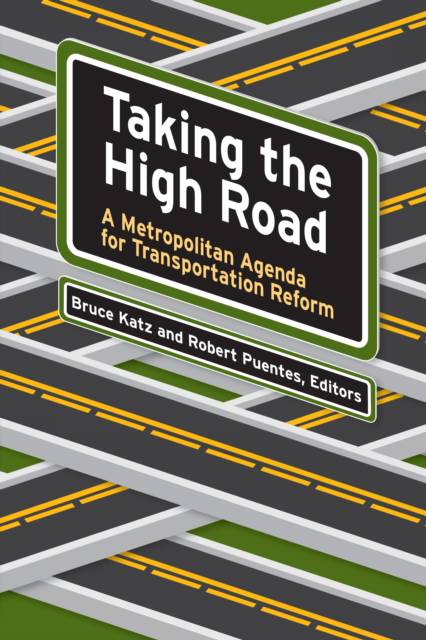
- Afhalen na 1 uur in een winkel met voorraad
- Gratis thuislevering in België vanaf € 30
- Ruim aanbod met 7 miljoen producten
- Afhalen na 1 uur in een winkel met voorraad
- Gratis thuislevering in België vanaf € 30
- Ruim aanbod met 7 miljoen producten
Zoeken
Taking the High Road
A Metropolitan Agenda for Transportation Reform
€ 50,95
+ 101 punten
Omschrijving
Since the early 1990s, federal transportation laws have slowly started to level the playing field between highway and alternative transportation strategies, as well as between older and newer communities. The Intermodal Surface Transportation Efficiency Act of 1991 and the Transportation Equity Act for the 21st Century made substantial changes in transportation practices. These laws devolved greater responsibility for planning and implementation to urban development organizations and introduced more flexibility in the spending of federal highway and transit funds. They also created a series of special programs to carry out important national objectives, and they tightened the linkages between transportation spending and issues such as metropolitan air quality. Taking the High Road examines the most pressing transportation challenges facing American cities, suburbs, and metropolitan areas. The authors focus on the central issues in the ongoing debate and deliberations about the nation's transportation policy. They go beyond the federal debate, however, to lay out an agenda for reform that responds directly to those responsible for putting these policies into practice--leaders at the state, metropolitan, and local levels. This book presents public officials with options for reform. Hoping to build upon the progress and momentum of earlier transportation laws, it ensures a better understanding of the problems and provides policymakers, journalists, and the public with a comprehensive guide to the numerous issues that must be addressed. Topics include - A wide-ranging policy framework that addresses the reauthorization debate - An examination of transportation finance and how it affects cities and suburbs - An analysis of metropolitan decisionmaking in transportation - The challenges of transportation access for working families and the elderly - The problems of increasing traffic congestion and the lack of adequate alternatives Contributors include Scott Bernstein (Center for Neighborhood Technology), Edward Biemborn (University of Wisconsin), Evelyn Blumenberg (UCLA), John Brennan (Cleveland State University), Anthony Downs (Brookings), Billie K. Geyer (Cleveland State), Edward W. Hill (Cleveland State), Arnold Howitt (Harvard University), Kevin E. O'Brien (Cleveland State), Ryan Prince (Brookings), Claudette Robey (Cleveland State), Sandra Rosenbloom (University of Arizona), Thomas Sanchez (Virginia Tech), Martin Wachs (University of California, Berkeley), and Margy Waller (Brookings).
Specificaties
Betrokkenen
- Uitgeverij:
Inhoud
- Aantal bladzijden:
- 344
- Taal:
- Engels
- Reeks:
Eigenschappen
- Productcode (EAN):
- 9780815748274
- Verschijningsdatum:
- 5/08/2005
- Uitvoering:
- Paperback
- Formaat:
- Trade paperback (VS)
- Afmetingen:
- 154 mm x 223 mm
- Gewicht:
- 458 g

Alleen bij Standaard Boekhandel
+ 101 punten op je klantenkaart van Standaard Boekhandel
Beoordelingen
We publiceren alleen reviews die voldoen aan de voorwaarden voor reviews. Bekijk onze voorwaarden voor reviews.






